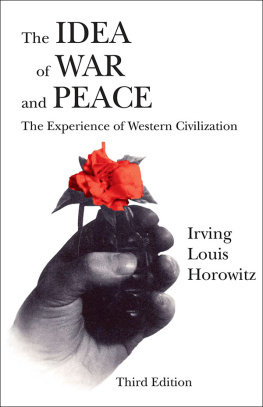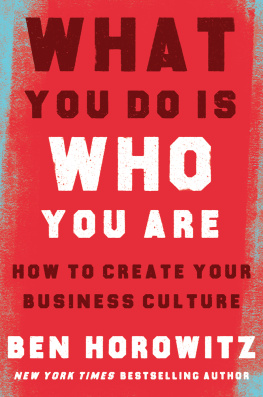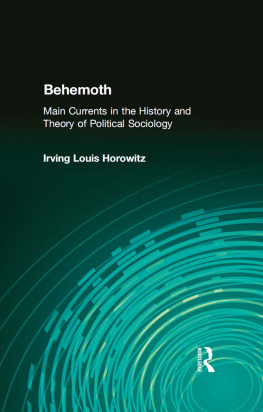First published 2002 by Transaction Publishers
Published 2017 by Routledge
2 Park Square, Milton Park, Abingdon, Oxon OX14 4RN
711 Third Avenue, New York, NY 10017, USA
Routledge is an imprint of the Taylor & Francis Group, an informa business
New material this edition copyright 2002 by Taylor & Francis.
All rights reserved. No part of this book may be reprinted or reproduced or utilised in any form or by any electronic, mechanical, or other means, now known or hereafter invented, including photocopying and recording, or in any information storage or retrieval system, without permission in writing from the publishers.
Notice:
Product or corporate names may be trademarks or registered trademarks, and are used only for identification and explanation without intent to infringe.
Library of Congress Catalog Number: 2001033299
Library of Congress Cataloging-in-Publication Data
Veblens century: a collective portrait / edited with an introduction by
Irving Louis Horowitz
p. cm.
Includes bibliographical references.
ISBN 0-7658-0099-3 (cloth: alk. paper) ISBN 0-7658-0882-X (pbk: alk. paper)
1. Veblen, Thorstein, 1857-1929. 2. EconomicsUnited States. I. Horowitz, Irving Louis.
HB119. V4 V43 2001
330'.092dc21
2001033299
ISBN 13: 978-0-7658-0882-0 (pbk)
ISBN 13: 978-0-7658-0099-2 (hbk)
It may strike the reader as presumptuous for an editor to entitle this volume Veblens Century. Every field of the sciences, humanities, and literature has its own heroes and icons. I have no wish to enter into an absurd contest as to whom is better or more important in the pantheon of scholars. Rather I have chosen this admittedly flamboyant title to illustrate the themes that played out over the course of time that are indelibly stamped with Thorstein Veblens imprint, not who owned the twentieth century in intellectual terms.
In doing so, I make no judgment that Veblen was a sage or a prophet, or as right as rain on every issue. Indeed, my own remarks on Veblens briefer essays, and many of the essays on Veblen contained in this special collection, call attention to the weakness of his formulations and even egregious mistakes in his predictions. That being the case, in what sense then can we define the twentieth century as Veblens? Indeed, he is rarely placed on the same pedestal as, say, Albert Einstein, Sigmund Freud, or even his fellow economist, John Maynard Keynes. Thus, the task of introducing also becomes an obligation to justify.
I am, nonetheless, confident that those who persevere in reading this collection will find its title appropriate. The special place of honor reserved for truly important figures is deserved by Thorstein Veblen iconoclastic economist, social critic, and moral judge of the American way of life. That Veblen has attracted such an unusually diverse and disparate group of commentators should in itself warrant close attention to him. People from every spectrum of political ideology and every branch of the social sciences have been drawn to his work sometimes in praise, sometimes in criticism, but always with a sense of measuring what he said and how, or if, his position can be trumped.
Institutions of higher learning have drifted from a stodgy conservatism to a militant radicalism. The leisure class has turned out to be something other than the ruling class. People of means seem to prefer privacy to ostentationand pay a great deal to achieve it. The power of wealth and assets is at least as apparent in our awareness as the conspicuous consumption that Veblen claimed guides us. One can continue in this vein in field after field: errors in the assessment of German intentions or capabilities, the role of corporate ownership vis--vis corporate management, and no less, a critique rather than celebration of American culture. Alienation from the mainstream has become more of a counterculture than Veblen ever imagined possible. But to fasten on such predictive shortcomings, as indeed we must at the sheer level of assessing truth, is to miss Veblens unique contributions in sensitizing American intellectuals to the master strategies and issues of our timehis time and now ours.
It is hard to believe that Veblen died in August 1929, or one month before my own birth. He obviously missed, if that is the correct word, the Depression, World War II, nuclear weapons, the Nazi system and the Holocaust, the Stalinist phase of Soviet communism, the emergence of a Third World, a communications revolution far beyond anything he could imagine, the emergence of a post-industrial capitalism, and the collapse of the communist system worldwide. In purely domestic terms, he barely comprehended the enormous shift in racial relations in the larger society and gender relations in more intimate aspects of social life. This is not a matter of right or wrong prognostications, but simple shattering events that redefined the American landscape and the world system.
So what then are Veblens contributions that have persisted through time? Each of the essays offers its own answer to such a question. My own assessment, and one to which others have also called attention, is not too hard to identify. First and foremost, is Veblens keen linkage of psychology and economy, of mind and money as it were. For it remains a fact, or at least I would aver such, that at the end of the century, these two disciplines have most sharply characterized American life. Ours is not a political culture. Not that we do not have politics. Rather our politics are all bunched up precisely in some middle ground, one that seeks particularly a fusion of personal sentiments and economic goals.
Because of this, Veblen was ultimately a studentan anthropologist if you willof the American culture. We share his emphasis, if not his alienation, his sense of the stranger within peering out at the complex foundation of behaviorwhether such behavior is defined in terms of attitudes toward work and leisure, wealth and poverty, and finally war and peace. For better or worse, twentieth-century America showed the face of the proximate future to the world. Veblen knew this well, better than any other serious commentator. With all the emphasis on Veblen as an outsider, and even a foreigner within our midst, he probably was that thinker who most closely touched the inner core of what makes the American a different sort of person from, say, the European or the Asian. We have to look back to an Alexis de Tocqueville to come up with another student of American life who has looked so deeply into the soft underbelly of a culture formed in equal measure by psychological need and economical greed.
A casual look at the contributors to the Veblen literature serves to illustrate this point. Whatever their disciplinary background, whether they be David Riesman, Douglas Dowd, Max Lerner, E. Digby Baltzell, C. Wright Mills, Daniel Bell, or the other outstanding contributors, all share with Veblen a linkage between economic system, psychological propensity, and cultural formation. And that gets us to the amorphous world of post-modernism that in truth began with Veblen even if it may have ended with Foucault, Derrida, and Lacan. He caught a sense of the malleability of culture that broke the back of the nineteenth-century stranglehold on social analysis. He did so by simply seeing systems as volitional rather than deterministic in character, formed by human beings rather than by actors playing out preordained scripts.











